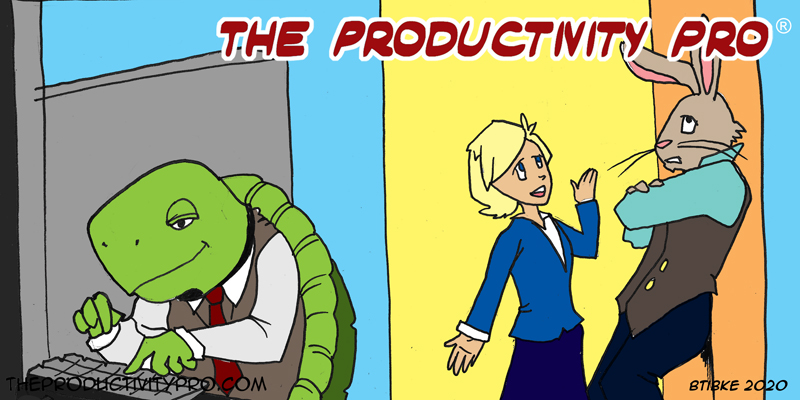
“The reward for work well done is the opportunity to do more.”—Jonas Salk, the inventor of the polio vaccine.
We all perform our work tasks at different rates of speed. What might take one person eight hours might take another four, due to experience, training, focus, automation, or systems. And therein lies one of the biggest issues at the heart of the standard modern business model — one that has increased annual productivity on the one hand and stalled it on the other. Until recently, the productivity increase has outweighed the slowdown; however, that’s becoming less true as time goes on.
Have you ever finished your tasks and meetings for the day, double-checked everything, and then found yourself with nothing urgently due? Many of us have. Sure, you could start on some other projects, but you don’t have to. Ideally, you could be done for the day and retain your full pay, since some days you work 14 hours.
While some of us have the flexibility to go home when work is done for the day, most employers won’t let you go home early because you “finished” early when you’re on salary. They could, and if we lived in a perfect world, they would. But here’s why they don’t want to…and don’t dare.
- Your employer expects you to pace yourself. Except during crunch times, most managers expect a marathon rather than a sprint. This seems reasonable at one level, as you’re less likely to tire yourself out or make mistakes if you don’t rush. However, it also appeals to the lowest common denominator, speed-wise. When my husband worked for the postal service 20 years ago, he was so much faster than others that he learned to take his time, lest he run out of work. Then he would get more work added and end up doing other’s work as well. And in some work environments, running out of work results in unemployment. Hence, productivity drags as workers stall to make the work last.
- Your employer expects a minimum work-week. You’ve signed up to sell a specific number of hours per week to your employer, and they expect you to fill at least that amount of time with work. If you slow down so your work fills the time available — not an unusual or even unreasonable expectation in corporate America — you’ve dropped anchor on productivity.
- Much white-collar work is fungible. In economics, “fungible” describes a product you can easily replace with an identical item. In the workaday sense, it basically refers to the fact that even when you finish one task, there’s always another waiting in the wings. The queue never really comes to an end. This is especially true with cyclical tasks.
- Everyone else would want to go home early. Even if your manager decided you weren’t cutting corners to finish early, the slower employees would resent you unless they got the same option… and then they might hurry to finish their work so they could leave early. Few businesses can function that way, especially the brick-and-mortar types. Worse, the slower workers, who aren’t as skilled as you at handling fast-paced work, might do a poor job (purposely or not) just to leave early.
- Teamwork. It may not seem fair, but if you finish your work early, many employers expect you to help the slower members of your team catch up. Team success trumps individual success, and it’s in your best interests to reach common goals. Sure, you may end up doing more than your share of the work as a result; but look at it as part of the dues you pay to be on a team. If the idea of having to do some of the work of your slower co-workers on top of your own displeases you, then you may be best off working either in a virtual role, or as a solo entrepreneur.
Workin’ for a Living
If you’re a fast worker and can stay busy at the office, you’ll boost your productivity — we’ve seen this as technology has increased our capabilities. But what if you work faster than more work comes in? A lack of challenge leads many high-revving individuals to search for more exciting pastures.
© 2020 Laura Stack. Laura Stack, MBA, CSP, CPAE is an award-winning keynote speaker, bestselling author, and noted authority on employee and team productivity. She is the president of The Productivity Pro, Inc., a company dedicated to helping leaders increase workplace performance in high-stress environments. Stack has authored eight books, including FASTER TOGETHER: Accelerating Your Team’s Productivity (Berrett-Koehler 2018). She is a past president of the National Speakers Association, and a member of its exclusive Speaker Hall of Fame (with fewer than 175 members worldwide). Stack’s clients include Cisco Systems, Wal-Mart, and Bank of America, and she has been featured on the CBS Early Show and CNN, and in the New York Times. To have Laura Stack speak at an upcoming meeting or event, call 303-471-7401 or contact us online.



I wonder how this shutdown will affect the corporate business model. Most higher-level management has always been married to the “if I can’t see them, they won’t do any work” mindset. With so many people working from home, I can see employees demanding more of it when things get back to abnormal, once everyone sees that work actually still gets done even when no one is standing over them.